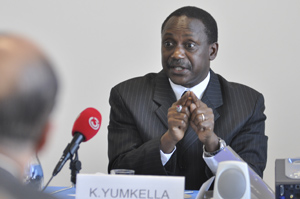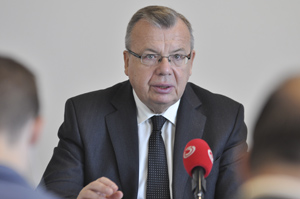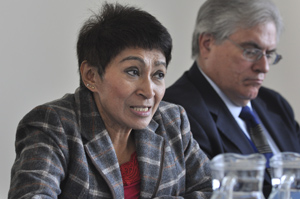


The heads of two Vienna-based United Nations organizations came together to discuss sustainable development with journalists at an event organized by the United Nations Information Service (UNIS) Vienna.
The Director-General of the United Nations Industrial Development Organization (UNIDO), Kandeh K. Yumkella, was joined by the Executive Director of the United Nations Office on Drugs and Crime (UNODC), Yury Fedotov to talk about how both their organizations' work is vital to sustainable development.
Journalists from Austria, Hungary, Slovakia and Slovenia as well as international correspondents based in Vienna joined in the debate at the Journalists Forum on "Post Rio: Towards the Sustainable Development Goals" at the Vienna International Centre (VIC) on 4 October 2012.
The participants also heard from the Director of the United Nations Office for Outer Space Affairs (UNOOSA), Mazlan Othman, the Head of the United Nations Environment Programme (UNEP) Liaison Office in Vienna, Harald Egerer and the Director of the Division of Programme Support and Coordination in the Department of Technical Coordination at the International Atomic Energy Agency (IAEA), Juan Antonio Casas-Zamora.
UNIS Vienna Director, Janos Tisovszky introduced the topic with an overview of the post-2015 global development agenda. "Recognizing the success of the Millennium Development Goals (MDGs) in reducing poverty and improving lives, countries agreed at the Rio+20 conference that there was a need to go beyond the 2015 MDG target date and have some goals on sustainable development.
"The Sustainable Development Goals, as they have become known, will be developed over the next two years," Mr. Tisovszky explained. Energy might well be one of them, as Kandeh K. Yumkella highlighted in his keynote address.
Mr. Yumkella, who was recently appointed as the Special Representative for the Sustainable Energy for All initiative by the UN Secretary-General Ban Ki-moon, presented the concept of sustainable energy as a prerequisite for any sustainable development. He will be heading a new network of centres around the world which will focus on promoting energy issues with Vienna as the main hub. "We are all aware of the fundamental role that energy access plays as a driver for development, in delivering health, education, food security and economic growth. We need change, and we need it urgently. We can, and we must, give three billion people the chance to build more productive, healthier lives," he said.
UNIDO launched its Green Industry platform at the Rio+20 conference, which is designed to bring together business, governments and civil society to use resources more efficiently, optimize water use, increase energy efficiency and manage chemicals and waste properly. "The old paradigm of 30 years was don't worry, build factories, grow fast, pollute, we'll clean up later, that cannot happen any longer - if we do that we will all perish," he said. Energy is the golden thread which runs through all the pillars of sustainable development. Without energy you cannot have prosperity and development and it is also linked to food security. He gave an example of how half of agricultural produce in Africa rots because of lack of energy for cooling systems and so on.
Yury Fedotov, the Executive Director of UNODC, emphasized the importance of mainstreaming drugs, crime and terrorism in the post-2015 sustainable development goals. Transnational organized crime, illicit drug trafficking and terrorism were all barriers to achieving the Millennium Development Goals (MDGs) and he saw it as his role to draw attention to the impact on development of these threats.
The proceeds of transnational organized in one year are estimated to be 870 billion US dollars which is greater the Gross Domestic Product of some G20 countries. No country was immune but weak and fragile countries, those emerging from conflict or those in transition to democracy suffer more said Mr. Fedotov. We need to foster economic growth and fight corruption at the same time, he said. UNODC is going to be working with UNIDO on alternative livelihoods projects to create jobs and offer real alternatives to illicit cultivation of drugs. In Colombia UNODC has already helped 150,000 farmers switch to sustainable livelihoods. Mr. Fedotov concluded: "We must recognize that it is a two way street - drugs, crime and terrorism must form part of the development agenda but sustainable development [must] create favourable conditions to curb transnational organized crime and all sorts of illicit drug abuse."
In the second session journalists heard how space technology can help sustainable development and Director of UNOOSA, Mazlan Othman explained how her office is working to help developing countries use space applications. The IAEA is using nuclear technology to help in development work and a video about food production and the agency's work was shown. The head of UNEP's Vienna Office, Harald Egerer told the forum more about UNEP's work for the environment and how their work in Vienna for the Carpathian Convention was important because of the sensitive nature of mountain environments. In response to a question about the ethics of the agency's work on sterilizing fruit flies Juan Antonio Casas-Zamora said we needed to have an informed debate. Sterilizing these pests which destroyed fruit crops did not make them radioactive and the alternatives such as insecticides would affect the environment.
Forum participants also joined an event to mark the start of this year's World Space Week at the VIC with the presentation of a navigation satellite model, donated by the Russian Federation. The model will go on display at the permanent exhibit of the Office for Outer Space Affairs in the VIC. Some spectacular pictures showing the earth from space are also on display at an "Art from Space" exhibition from 4 to 10 October in the Rotunda of the VIC. The pictures were taken by the NASA Landsat-satellite over the past 40 years.